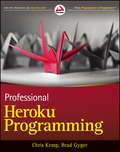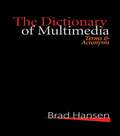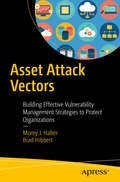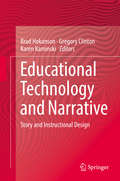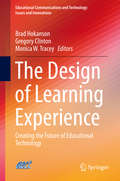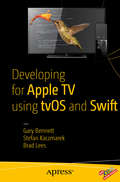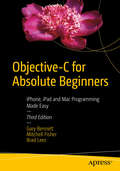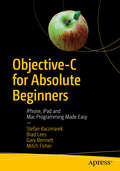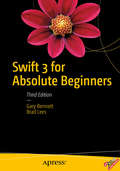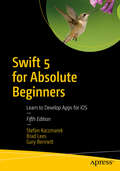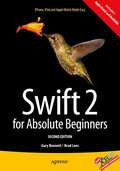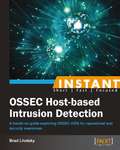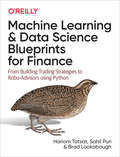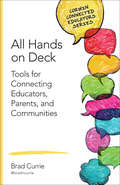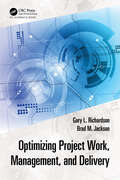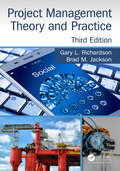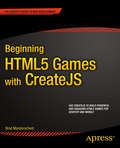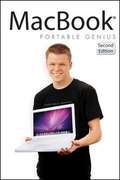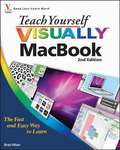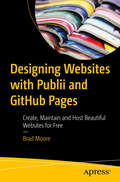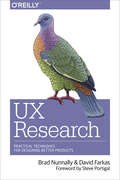- Table View
- List View
Professional Heroku Programming
by Chris Kemp Brad GygerA complete guide to building and deploying web apps with HerokuA cloud application platform, Heroku is currently the only approved platform for creating apps within Facebook, and its number of users is growing at rapid pace. However, there are very few books on the market that offer professional-level coverage of this platform, until now. The author duo begins with an introduction to the Heroku platform and its associated core concepts and then goes on to explain how writing for this platform differs from that of traditional development systems. Example applications, additional resources, and advice for your next steps round out this resource, making it a thorough, indispensable guide. Features information not found anywhere else, as both authors work for HerokuExplains the inner workings of Heroku with special emphasis placed on building web and mobile applicationsIntroduces GIT-based development workflow and the process model within the Heroku platformDetails coding, building, deploying, and scaling effectively using the Heroku tool baseProviding you with fully functional code and downloadable code examples, Professional Heroku Programming is your complete guide to mastering this platform.
The Dictionary of Multimedia 1999: Terms and Acronyms
by Brad HansenThis book is for programmers, graphic artists, writers, video producers, audio engineers, network managers, hardware technicians, and telecommunications professionals who embrace the complex world of digital media and realize the need for a common language in which to communicate with one another.
Asset Attack Vectors: Building Effective Vulnerability Management Strategies to Protect Organizations
by Morey J. Haber Brad HibbertBuild an effective vulnerability management strategy to protect your organization’s assets, applications, and data.Today’s network environments are dynamic, requiring multiple defenses to mitigate vulnerabilities and stop data breaches. In the modern enterprise, everything connected to the network is a target. Attack surfaces are rapidly expanding to include not only traditional servers and desktops, but also routers, printers, cameras, and other IOT devices. It doesn’t matter whether an organization uses LAN, WAN, wireless, or even a modern PAN—savvy criminals have more potential entry points than ever before. To stay ahead of these threats, IT and security leaders must be aware of exposures and understand their potential impact. Asset Attack Vectors will help you build a vulnerability management program designed to work in the modern threat environment. Drawing on years of combined experience, the authors detail the latest techniques for threat analysis, risk measurement, and regulatory reporting. They also outline practical service level agreements (SLAs) for vulnerability management and patch management. Vulnerability management needs to be more than a compliance check box; it should be the foundation of your organization’s cybersecurity strategy. Read Asset Attack Vectors to get ahead of threats and protect your organization with an effective asset protection strategy. What You’ll Learn Create comprehensive assessment and risk identification policies and procedures Implement a complete vulnerability management workflow in nine easy steps Understand the implications of active, dormant, and carrier vulnerability states Develop, deploy, and maintain custom and commercial vulnerability management programs Discover the best strategies for vulnerability remediation, mitigation, and removal Automate credentialed scans that leverage least-privilege access principles Read real-world case studies that share successful strategies and reveal potential pitfalls Who This Book Is For New and intermediate security management professionals, auditors, and information technology staff looking to build an effective vulnerability management program and defend against asset based cyberattacks
Educational Technology and Narrative: Story And Instructional Design
by Karen Kaminski Brad Hokanson Gregory ClintonThis volume is the result of a 2016 research symposium sponsored by the Association for Educational Communications and Technology (AECT) focused on the growing theoretical areas of integrating story and narrative into educational design. Narrative, or storytelling, is often used as a means for understanding, conveying, and remembering the events of our lives. Our lives become a series of stories as we use narrative to structure our thinking; stories that teach, train, socialize, and create value. The contributions in this volume examine stories and narrative in instructional design and offer a diverse exploration of instructional design and learning environments. Among the topics discussed: The narrative imperative: creating a story telling culture in the classroom. Narrative qualities of design argumentation. Scenario-based workplace training as storytelling. Designing for adult learners' metacognitive development & narrative identity. Using activity theory in designing science inquiry games . Changing the narrative of school: toward a neurocognitive redefinition of learning. Educational Technology and Narrative is an invaluable resource offering application-ready ideas to students of instructional design, instructional design practitioners, and teachers seeking to utilize theories of story and narrative to the ways that they convey and express ideas of instructional design and educational technology.
The Design of Learning Experience
by Monica W. Tracey Brad Hokanson Gregory ClintonThis book delves into two divergent, yet parallel themes; first is an examination of how educators can design the experiences of learning, with a focus on the learner and the end results of education; and second, how educators learn to design educational products, processes and experiences. The book seeks to understand how to design how learning occurs, both in the instructional design studio and as learning occurs throughout the world. This will change the area's semantics; at a deeper level, it will change its orientation from instructors and information to learners; and it will change how educators take advantage of new and old technologies. This book is the result of a research symposium sponsored by the Association for Educational Communications and Technology [AECT].
Guia Prático das Câmeras GoPro Hero e Fusion: Como usar a sua GoPro Fusion e Hero 4/5/6/7 disponíveis em Black e White
by Brad JohnsonAprenda a usar a sua câmera GoPro como um profissional! Este guia é para quem procura capturar vídeos incríveis em seu dispositivo GoPro. Compatível com GoPro Fushion, Hero 4,5,6 e 7. Este livro aborda tudo o que você precisa saber: - Tirar fotos e vídeos incríveis - Fotos de lapso de tempo - Fotografia em movimento - Compartilhando seus vídeos e fotos - Fotografia subaquática - Composição das filmagens - Uso da bateria - Resolução e campo de visão - Uso do estabilizador Gimbal - Técnicas de edição de vídeo - E MAIS!
Developing for Apple TV using tvOS and Swift
by Gary Bennett Stefan Kaczmarek Brad LeesGary Bennett, Brad Lees, and Stefan Kaczmarek, the team behind Swift 2 for Absolute Beginners, brings you a hands-on "Swift" introduction to the new tvOS SDK with a collection of app projects to try out. You'll learn how to create a BookStore app for the TV, including using Stack Views for book details, how to create a photo gallery app, and how to use collection view and split view controllers with a music collection app. Finally, you'll also learn how to store Apple TV app data in iCloud. The new Apple TV is here, and it's open for your native apps -- Developing for the Apple TV with tvOS and Swift will get you started developing right away. What you'll learn How to use stack views in tvOS How to use collection views and split view controllers How to store Apple TV app data in iCloud How to create native apps for books, photos, and music on the Apple TV Who this book is for Intermediate iOS developers who want to create native Apple TV apps using the new tvOS SDK. Table of Contents Chapter 1: Getting Started with the New Apple TV Chapter 2: The tvOS Weather App Chapter 3: Stack Views and the Focus Engine Chapter 4: Creating a Photo Gallery App Chapter 5: Adding an Album Browser to the Photo Gallery App Chapter 6: Adding a Dynamic Top Shelf to the Photo Gallery App Chapter 7: Storing and Sharing Data Chapter 8: CloudKit
Objective-C for Absolute Beginners
by Gary Bennett Brad Lees Mitchell FisherIt seems as if everyone is writing applications for Apple's iPhone and iPad, but how do they all do it? It's best to learn Objective-C, the native language of both the iOS and Mac OS X, but where to begin? Right here, even if you've never programmed before! Objective-C for Absolute Beginners will teach you how to write software for your Mac, iPhone, or iPad using Objective-C, an elegant and powerful language with a rich set of developer tools. Using a hands-on approach, you'll learn to think in programming terms, how to use Objective-C to build program logic, and how to write your own applications and apps. With over 50 collective years in software development and based on an approach pioneered at Carnegie Mellon University, the authors have developed a remarkably effective approach to learning Objective-C. Since the introduction of Apple's iPhone, the authors have taught hundreds of absolute beginners how to develop Mac, iPhone,and iPad apps, including many that became popular apps in the iTunes App Store. What you'll learn The fundamentals of computer programming: how to understand variables,design data structures, and work with file systems The logic of object-oriented programming: how to use Classes, Objects, and Methods The flexibility of Apple's developer tools: how to install Xcode and write programs in Objective-C The power of Cocoa and Cocoa touch: how to make Mac OS X applications or iOS apps that do cool stuff Who this book is for Everyone! This book is for anyone who wants to learn to develop applications for the Mac or apps for the iPhone and iPad using the Objective-C programming language. No previous programming experience is necessary. Table of Contents Becoming a Great iPhone/iPad or Mac Programmer Programming Basics It's All About the Data Making Decisions About. . . and Planning Program Flow Object Oriented Programming with Objective-C Introducing Objective-C and Xcode Objective-C Classes, Objects, and Methods Programming Basics in Objective-C Comparing Data Creating User Interfaces with Interface Builder Memory, Addresses, and Pointers Debugging Programs with Xcode Storing Information Protocols and Delegates
Objective-C for Absolute Beginners: Iphone, Ipad And Mac Programming Made Easy
by Gary Bennett Stefan Kaczmarek Brad Lees Mitch FisherLearn Objective-C and its latest release, and learn how to mix Swift with it. You have a great idea for an app, but how do you bring it to fruition? With Objective-C, the universal language of iPhone, iPad, and Mac apps. Using a hands-on approach, you'll learn how to think in programming terms, how to use Objective-C to construct program logic, and how to synthesize it all into working apps. Gary Bennett, an experienced app developer and trainer, will guide you on your journey to becoming a successful app developer. Along the way you'll discover the flexibility of Apple’s developer toolsIf you're looking to take the first step towards App Store success, Objective-C for Absolute Beginners, Fourth Edition is the place to start.What You'll LearnUnderstand the fundamentals of computer programming: variables, design data structures, and working with file systemsExamine the logic of object-oriented programming: how to use classes, objects, and methodsInstall Xcode and write programs in Objective-CWho This Book Is ForAnyone who wants to learn to develop apps for the iPhone, iPad, Mac, or Watch using the Objective-C programming language. No previous programming experience is necessary.
Swift 3 for Absolute Beginners
by Gary Bennett Brad LeesStay motivated and overcome obstacles while learning to use Swift Playgrounds to be a great iOS developer. This book is perfect for those with no programming background, those with some programming experience but no object-oriented experience, or those that have a great idea for an app but haven't programmed since school, and it is now updated for Swift 3. Many people have a difficult time believing they can learn to write iOS apps. Swift 3 for Absolute Beginners, along with the free, live online training sessions will show you how to do so. You'll learn Object Oriented Programming and be introduced to HealthKit before moving on to write your own iPhone and Watch apps from scratch. Gary Bennett and Brad Lees are full-time professional iOS developers and have developed a broad spectrum of apps for Fortune 500 companies. The authors have taken their combined 12 years of writing apps, teaching online iOS courses, the experience from their first three iOS books, along with their online instruction and free online forum at XcelMe. com to create an excellent training book. What You'll Learn: #65533; Work with Swift classes, properties, and functions #65533; Examine proper user interface and user experience design #65533; Understand Swift data types: integers, floats, strings, and booleans #65533; Use Swift data collections: arrays and dictionaries #65533; Review Boolean logic, comparing data, and flow control Who This Book Is For Anyone who wants to learn to develop apps for the Mac, iPhone, and iPad, and Watch using the Swift programming language. No previous programming experience is necessary.
Swift 5 for Absolute Beginners: Learn to Develop Apps for iOS
by Gary Bennett Stefan Kaczmarek Brad LeesStay motivated and overcome obstacles while learning to use Swift Playgrounds and Xcode 10.2 to become a great iOS developer. This book, fully updated for Swift 5, is perfect for those with no programming background, those with some programming experience but no object-oriented experience, or those that have a great idea for an app but haven’t programmed since school.Many people have a difficult time believing they can learn to write iOS apps. Swift 5 for Absolute Beginners will show you how to do so. You'll learn Object-Oriented Programming (OOP) and be introduced to User Interface (UI) design following Apple’s Human Interface Guidelines (HIG) using storyboards and the Model-View-Controller (MVC) pattern before moving on to write your own iPhone and Apple Watch apps from scratch.What You’ll LearnWork with Swift classes, properties, and functionsExamine proper User Interface (UI) and User Experience (UX) designUnderstand Swift data types: integers, floats, strings, and booleansUse Swift data collections: arrays and dictionariesReview Boolean logic, comparing data, and flow controlUse the Xcode debugger to troubleshoot problems with your appsStore data in local app preferences and Core Data databases Who This Book Is ForAnyone who wants to learn to develop apps for the Mac, iPhone, iPad, and Apple Watch using the Swift programming language. No previous programming experience is necessary.
Swift for Absolute Beginners
by Gary Bennett Brad LeesThe professional development team that brought you two editions of Objective-C for the Absolute Beginners and have taught thousands of developers around the world to write some of the most popular iPhone apps in their categories on the app store, have now leveraged their instruction for Swift. Swift for Absolute Beginners is perfect for those with no programming background, those with some programming experience but no object-oriented experience, or those that have a great idea for an app but haven't programmed since school. Gary Bennett and Brad Lees are full-time professional iOS developers and have developed a broad spectrum of apps for Fortune 500 companies. The authors have taken their combined 12 years of writing apps, teaching online iOS courses, the experience from their first two iOS books, along with their free online instruction and free online forum to create an excellent training book. Topics include: How to be successful at learning SwiftUsing Swift Playgrounds to learn iOS development quicklyWhat is Object Oriented ProgrammingWhat are Swift classes, properties, and functionsProper user interface and user experience designSwift data types: integers, floats, strings, booleansHow to use Swift data collections: arrays and dictionariesBoolean logic, comparing data, and flow controlWriting iPhone apps from scratchAvoiding Swift pitfallsMany students have a difficult time believing they can learn to write iOS apps or just staying motivated through learning the process. This book, along with the free, live online training sessions, helps students stay motivated and overcome obstacles while they learn to be great iOS developers.
Instant OSSEC Host-based Intrusion Detection
by Brad LhotskyFilled with practical, step-by-step instructions and clear explanations for the most important and useful tasks. A fast-paced, practical guide to OSSEC-HIDS that will help you solve host-based security problems.This book is great for anyone concerned about the security of their servers-whether you are a system administrator, programmer, or security analyst, this book will provide you with tips to better utilize OSSEC-HIDS. Whether you're new to OSSEC-HIDS or a seasoned veteran, you'll find something in this book you can apply today!This book assumes some knowledge of basic security concepts and rudimentary scripting experience.
Machine Learning and Data Science Blueprints for Finance: From Building Trading Strategies To Robo-advisors Using Python
by Hariom Tatsat Sahil Puri Brad LookabaughOver the next few decades, machine learning and data science will transform the finance industry. With this practical book, analysts, traders, researchers, and developers will learn how to build machine learning algorithms crucial to the industry. You'll examine ML concepts and over 20 case studies in supervised, unsupervised, and reinforcement learning, along with natural language processing (NLP).Ideal for professionals working at hedge funds, investment and retail banks, and fintech firms, this book also delves deep into portfolio management, algorithmic trading, derivative pricing, fraud detection, asset price prediction, sentiment analysis, and chatbot development. You'll explore real-life problems faced by practitioners and learn scientifically sound solutions supported by code and examples.This book covers:Supervised learning regression-based models for trading strategies, derivative pricing, and portfolio managementSupervised learning classification-based models for credit default risk prediction, fraud detection, and trading strategiesDimensionality reduction techniques with case studies in portfolio management, trading strategy, and yield curve constructionAlgorithms and clustering techniques for finding similar objects, with case studies in trading strategies and portfolio managementReinforcement learning models and techniques used for building trading strategies, derivatives hedging, and portfolio managementNLP techniques using Python libraries such as NLTK and scikit-learn for transforming text into meaningful representations
All Hands on Deck: Tools for Connecting Educators, Parents, and Communities (Corwin Connected Educators Series)
by Brad M. CurrieBring communities together for involvement that makes a difference! Impact your students in a positive way and join the leagues of educators who are learning to engage with students, parents, and communities using social media and Web 2.0 technologies. Featuring practical strategies that you’ll want to put to use right away, plus a dedicated series website for additional resources, this short and easy-to-follow book will show you: How smartphones and tablets can work for your goals The secret to getting—and keeping—parents involved How to inform, engage, and empower stakeholders How tools like Skype can connect the community at large The Corwin Connected Educators series is your key to unlocking the greatest resource available to all educators: other educators. Being a Connected Educator is more than a set of actions: it’s a belief in the potential of technology to fuel lifelong learning. "Currie harnesses the key element in today’s social media-infused school environment—‘Knowledge is Power!’ He illustrates just how we need to use this knowledge to support our schools, students, and communities." Daisy Dyer Duerr, Principal St. Paul Public Schools "This book provides educators with a diversified look at the connections schools can make with technology. It will inspire all of us, on a global scale, to stay active in ways once thought unimaginable." Salome Thomas-EL, Award-winning principal and author
All Hands on Deck: Tools for Connecting Educators, Parents, and Communities (Corwin Connected Educators Series)
by Brad M. CurrieBring communities together for involvement that makes a difference! Impact your students in a positive way and join the leagues of educators who are learning to engage with students, parents, and communities using social media and Web 2.0 technologies. Featuring practical strategies that you’ll want to put to use right away, plus a dedicated series website for additional resources, this short and easy-to-follow book will show you: How smartphones and tablets can work for your goals The secret to getting—and keeping—parents involved How to inform, engage, and empower stakeholders How tools like Skype can connect the community at large The Corwin Connected Educators series is your key to unlocking the greatest resource available to all educators: other educators. Being a Connected Educator is more than a set of actions: it’s a belief in the potential of technology to fuel lifelong learning. "Currie harnesses the key element in today’s social media-infused school environment—‘Knowledge is Power!’ He illustrates just how we need to use this knowledge to support our schools, students, and communities." Daisy Dyer Duerr, Principal St. Paul Public Schools "This book provides educators with a diversified look at the connections schools can make with technology. It will inspire all of us, on a global scale, to stay active in ways once thought unimaginable." Salome Thomas-EL, Award-winning principal and author
Optimizing Project Work, Management, and Delivery
by Gary L. Richardson Brad M. JacksonThousands of project management–related books have been written. Why is Optimizing Project Work, Management, and Delivery different? This book represents the authors’ experiences gained from looking at the problem of project management for 50 years and wondering why projects cannot be more successful. Experience from various management models and techniques has helped but still does not fit reality or provide accurate forecasts. Industry surveys have compiled the root causes of project failure, and yet they persist. Is there no answer to this problem? As the book explains, the management solution is not in the models or the theory but is found in how they are mapped against the actual target project characteristics. This is the book’s unique strength. There are major coverage gaps in current project management models that also need to be recognized. All of the existing models are correct in some ways, and yet each is also wrong. The book starts by reviewing popular models and related topics that help construct the building blocks of an integrated model structure, which is at the core of this book. The integrated model described here is meant to be a decision-oriented view related to the project life cycle rather than a cookbook of success steps. Project management is too complex for a cookbook approach. This text helps managers find that right path.
Project Management Theory and Practice, Third Edition
by Gary L. Richardson Brad M. JacksonProject Management: Theory and Practice, Third Edition gives students a broad and real flavor of project management. Bringing project management to life, it avoids being too sterilely academic and too narrowly focused on a particular industry view. It takes a model-based approach towards project management commonly used in all industries. The textbook aligns with the latest version of the Project Management Institute’s Project Management Body of Knowledge (PMBOK®) Guide, which is considered to be the de facto standard for project management. However, it avoids that standard’s verbiage and presents students with readable and understandable explanations. Core chapters align with the Project Management Institute’s model as well as explain how this model fits real-world projects. The textbook can be used as companion to the standard technical model and help those studying for various project management certifications. The textbook takes an in-depth look at the following areas important to the standard model: Work Breakdown Structures (WBS) Earned Value Management (EVM) Enterprise project management Portfolio management (PPM) Professional responsibility and ethics Agile life cycle The text begins with a background section (Chapters 1–9) containing material outside of the standard model structure but necessary to prepare students for the 10 standard model knowledge areas covered in the chapters that follow. The text is rounded out by eight concluding chapters that explain advanced planning approaches models and projects’ external environments. Recognizing that project management is an evolving field, the textbook includes section written by industry experts who share their insight and expertise on cutting-edge topics. It prepares students for upcoming trends and changes in project management while providing an overview of the project management environment today. In addition to guiding students through current models and standards, Project Management: Theory and Practice, Third Edition prepares students for the future by stimulating their thinking beyond the accepted pragmatic view.
The State of Global Education: Learning with the World and its People (Citizenship, Character and Values Education)
by Jeremy Hilburn Brad MaguthA battle is being waged in classrooms and capitals around the world over the goals and objectives of the future of global education. While there is growing research in the area of global education, much remains to be uncovered, challenged, and learned through sound empirical research and conceptual explorations. What type of global citizens will schools promote? What types of policies, programs and instructional practices best promote effective global citizenship? Will global education curricula advance an unwavering loyalty to neoliberal ideologies and interests over the strengthening of human rights and the environmental health of our planet? This volume presents a series of research studies and innovative instructional practices centered on advancing global learning opportunities and literacies. The authors in this volume initiate a much needed conversation on ways students in multiple contexts can and should learn with the world and its people. Part I addresses global education in theory, with a particular focus on development, intercultural competence, and global citizenship. Part II addresses educational programs and practices that foster global learning and action to help build a better future for all citizens of our planet – including experiential education, university initiatives, and conceptual approaches to teaching and learning. This scholarship spans four continents in a multitude of educational contexts – primary, secondary, and tertiary - each with a focus on a different dimension of the possibilities and pitfalls in teaching about and with the world and its people.
Beginning HTML5 Games with CreateJS
by Brad ManderscheidBeginningHTML5 Games with CreateJS provides a hands-on approach to get you up and running withthe most comprehensive tools available for HTML5 Canvas game development. Whether you are brand new to making games or an experienced game developer, youOCOll learn to fully utilize the CreateJS suite to bring your new or existinggame techniques to desktop and mobile devices. Thisbook covers everything from creating graphics in HTML5 Canvas, to capturinguser input (whether from keyboard, mouse, or touch), to using a state machinefor efficient game control. There are practical (and fun) examples throughoutthe book, with four full game projects, including a mobile RPG. The book alsocovers optimizing your games for mobile and publishing them to app stores. HTML5games are growing more and more popular, and the demand for HTML5 Canvas skillsis on the rise. The CreateJS suite is a powerful toolset that will help youmanage Canvas drawing and animations, asset loading, sound management, complextweening, and much more. Using these robust libraries, you can build powerfuland engaging games that reach a wide range of audiences and devices. "
MacBook Portable Genius, Second Edition
by Brad MiserUpdated tips, tricks, and shortcuts for making the most out of the MacBook Packed with the most accessible and useful information on the MacBook and written by veteran author Brad Miser, this handy guide shares the most tantalizing techniques intriguing insider tips for getting the most out of your MacBook. Since the release of the first edition, there have been extensive changes to MobileMe and iLife '09 and this fluff-free book encourages you to dive in and get up to speed on all the latest updates. You'll get the goods on the upcoming release of Mac OS X Snow Leopard as well as tricks on everything from using the desktop with the Dashboard and its widgets to running Windows applications on your MacBook. Shares shortcuts and secrets for making the most of Apple's sleek and high-performing portable computer, the MacBook Skips the fluff and delivers just the essentials on key topics, including the changes to MobileMe and iLife '09 Features more than 300 color screen shots and convenient 6x9 trim size travels wherever you go Divulges details for running Windows applications and using the desktop with the Dashboard If you're eager to make the most of your MacBook and interested in sharpening your key skills, then this captivating companion is for you!
Teach Yourself VISUALLY MacBook
by Brad MiserGet up and running quickly with all the latest updates to the MacBook The MacBook is an incredibly popular laptop choice, boasting light weight and tremendous speed. If you're a visual learner who is eager to get started with all that the MacBook has to offer, then this is the book for you! Packed with full-color photos and screen shots, this vital book walks you step by step through everything from the basics (such as powering on or shutting down the MacBook) to working with the Dashboard and its widgets to running the new Mac OS X Snow Leopard operating system. Veteran author Brad Miser escorts you through all the vitals and even offers invaluable advice for troubleshooting common problems. The MacBook is gaining popularity and this book is essential for visual learners who are eager to get started using their MacBook Covers the new Mac OS X Snow Leopard, as well as updates to iLife and MobileMe Lavish photos and screen shots offer you enhanced visual assistance while you learn the ins and outs of the MacBook Veteran author Brad Miser breaks down each topic to make it understandable for visual learners Keep this indispensible visual guide at arm's reach and get up and running with your MacBook the fast and easy way!
iPhoto '11 Portable Genius
by Brad MiserWhat serious fans need to take full advantage of iPhoto Part of the incredibly popular iLife suite that comes loaded on every Mac, iPhoto is the standard for digital photo management and editing programs. This smart and clever guide gives iPhoto users the inside track on the key skills, tools and shortcuts to accomplish every task iPhoto can do, including some hidden gems that most users miss. It helps maximize the key features of the newest version so Mac users can get the most from their systems. iPhoto is part of the iLife digital lifestyle suite that is pre-installed on every new Mac; this guide helps Mac users take full advantage of its features Packed with facts, secrets, tips, and techniques to help you manage and edit your digital photos more effectively Includes key information that can save you time and hassle and uncovers facts you might not discover just by using the software Authoritative but down-to-earth, this small book is big on expert advice that helps you discover and make the most of every feature of iPhoto.
Designing Websites with Publii and GitHub Pages: Create, Maintain and Host Beautiful Websites for Free
by Brad MooreDoes getting online seem overwhelmingly difficult? Are you paying too much for your hosting solution? Have you always wanted to have a blog but don’t know where to start? Do you settle for a Facebook page for your business website but know you need more? The solution to these problems is choosing the right tools. This book will guide you through the process of setting up a Publii-based publishing platform and hosting your site for free on GitHub. Publii is a free, open source, desktop application that runs on Windows, Mac, and Linux and makes building the website or blog you dream of is a simple process. This book walks you through the process of installing and using Publii, setting up accounts on GitHub and hosting a static blog or website there. You will gain background insights on here to get no-cost imagery for website, how to leverage AI to generate ideas, outlines, and images. You’ll also review search engine optimization (SEO) best practices to ensure your site is searchable. Designing Websites with Publii and GitHub Pages is your roadmap to creating a website and understanding how the publishing workflow works. What You Will Learn Use text editors such as WYSIWYG, Block, and Markdown Make a page from a post. Work on advanced processes such as installing themes and plugins Manage and back up your data Explore GDRP and cooking banner considerations Who This Book Is For Those with limited or no programming or compute skills who want to learn how to set up a website.
UX Research: Practical Techniques for Designing Better Products
by Brad Nunnally David FarkasOne key responsibility of product designers and UX practitioners is to conduct formal and informal research to clarify design decisions and business needs. But there’s often mystery around product research, with the feeling that you need to be a research Zen master to gather anything useful. Fact is, anyone can conduct product research. With this quick reference guide, you’ll learn a common language and set of tools to help you carry out research in an informed and productive manner.This book contains four sections, including a brief introduction to UX research, planning and preparation, facilitating research, and analysis and reporting. Each chapter includes a short exercise so you can quickly apply what you’ve learned.Learn what it takes to ask good research questionsKnow when to use quantitative and qualitative research methodsExplore the logistics and details of coordinating a research sessionUse softer skills to make research seem natural to participantsLearn tools and approaches to uncover meaning in your raw dataCommunicate your findings with a framework and structure
